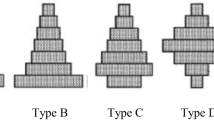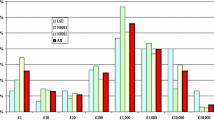Abstract
We analyse questionnaire data from a representative sample of the Flemish working population. For 781 respondents we construct their perception of the actual and of the fair income distribution. We check whether the use of different inequality measures leads to different interpretations of these data. The ranking of individuals on the basis of their perceived and fair inequality is hardly affected and the same is true for the explanation of the interindividual variation. However, the simple classification of individual respondents in those who want and those who do not want less inequality does depend on the measure used in 20% of the cases. Moreover, the tendency to equalise is a poor measures of conservatism.
Similar content being viewed by others
References
Amiel, Y., and Cowell, F., (1999):Thinking About Inequality. Cambridge: Cambridge University Press.
Arts, W., Hermkens, P., and van Wijck, P. (1991): “Income and The Idea Of Justice: Principles, Judgments and Their Framing.”Journal of Economic Psychology 12: 121–140.
Arts, W., and van der Veen, R. (1992): “Sociological Approaches To Distributive and Procedural Justice.” InJustice: Interdisciplinary Perspectives, edited by K. Scherer, pages 143–176. Cambridge: Cambridge University Press.
Atkinson, A. (1970): “On The Measurement Of Inequality.”Journal of Economic Theory 2: 244–263.
Ballano, C., and Ruiz-Castillo, J. (1993): “Searching By Questionnaire For The Meaning Of Income Inequality.”Revista Espanola de Economia 10: 233–259.
Bouckaert, L. et al. (1990):Wie verdient meer? Leuven: Acco.
Cowell, F. (1980): “Generalised Entropy and The Measurement Of Distributional Change.”European Economic Review 13: 147–159.
Harrison, E., and Seidl, C. (1994a): “Acceptance Of Distributional Axioms: Experimental Findings.” InModels and Measurement Of Welfare and Inequality, edited by W. Eichhorn, pages 67–99. Berlin: Springer.
Harrison, E., and Seidl, C. (1994b): “Perceptional Inequality and Preferential Judgments: An Empirical Examination Of Distributional Axioms.”Public Choice 79: 61–81.
Kolm, S.-C. (1976): “Unequal Inequalities I.”Journal of Economic Theory 12: 416–442.
Miller, D. (1995): “Popular Beliefs About Social Justice: A Comparative Approach.” InIn The Eye Of The Beholder, edited by S. Svallfors, pages 71–103. Bank Of Sweden: Bank Of Sweden Tercentenary Foundation.
Overlaet, B., and Lagrou, L. (1981): “Attitude Towards A Redistribution Of Income.”Journal of Economic Psychology 1: 197–215.
Schokkaert, E., and Capéau, B. (1991): “Interindividual Differences In Opinions About Distributive Justice.”Kyklos 44: 325–345.
Schokkaert, E., and Lagrou, L. (1983): “An Empirical Approach To Distributive Justice.”Journal of Public Economics 21: 33–52.
Shorrocks, A. (1983): “Ranking Income Distributions.”Econominca 50: 3–17.
Szirmai, A. (1988):Inequality Observed. Alderhof: Avebury/Gower.
Taylor-Gooby, P. (1993): “What Citizens Want From The State.” InInternational Social Attitudes, The 10th BSA Report, edited by R. Jowell et al., pages 81–101. Dartmouth, Aldershot: Social and Community Planning Research.
van Wijck, P. (1994): “Evaluating Income Distributions.”Journal of Economic Psychology 15: 173–190.
Author information
Authors and Affiliations
Corresponding author
Rights and permissions
About this article
Cite this article
Decoster, A., Schokkaert, E. The choice of inequality measure in empirical research on distributive judgements. J. Econ. 77 (Suppl 1), 197–222 (2002). https://doi.org/10.1007/BF03052504
Published:
Issue Date:
DOI: https://doi.org/10.1007/BF03052504




